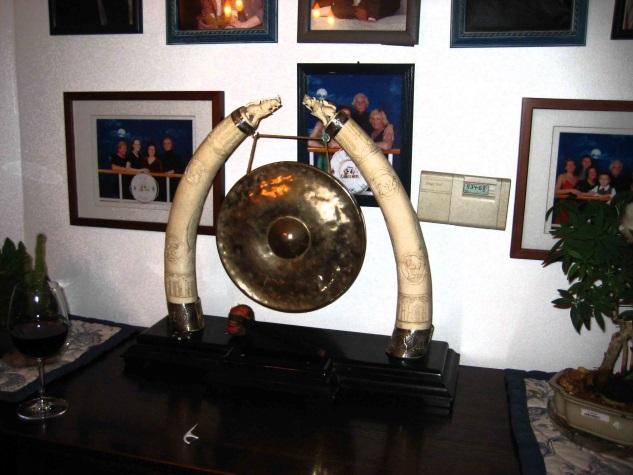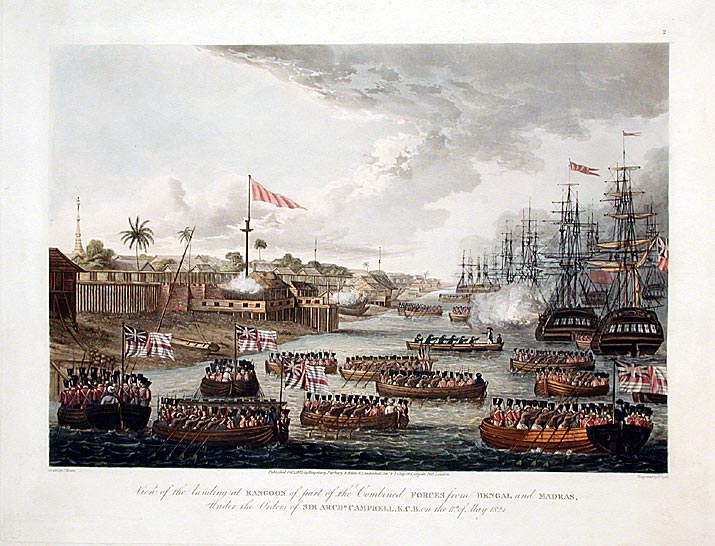This post focuses on British Colonialism and what a colonial government usually needed. A colonial government needed military personnel, police, doctors, dentists, entrepreneurs, and more. Entrepreneurs were needed in the timber sector, especially for valuable teak. The timber merchant is Scottish, which points out that Burma was called the ‘Scottish’ colony. The mention of the ‘timber man’ and the ‘policeman’ at the back of the photograph generates some associations for me.
Ivory Dinner Gong and Striker
An ivory dinner gong and striker are among these associations. The houses we had lived in over the years all had about the same furniture, fittings, and curios. One of these things was an ivory dinner gong usually placed near the front door. When I was a child, I did not give it a second thought—why did we have a gong if it was not used as a practical ‘dinner gong?’ The only interest it held for me as a child was that it was fun hitting the gong with the striker. But half a century later, it can perhaps serve as a metaphor for the British exploitation of Burma.
The timber industry in Burma depended heavily on the use of elephants. When the elephants died from overwork, they could still be useful, apart from the meat, the elephants’ tusks were also valuable as there was a booming ivory trade. My father was one such consumer in the ivory trade, when he bought or received as a gift the ivory dinner gong.
Shooting an Elephant
All these elements—oppressive colonial rule, the timber trade, the exploitation of elephants, and the role of the colonial policeman—are ingeniously woven together in George Orwell’s “Shooting an Elephant” (1936):
“The essay describes the experience of the English narrator, possibly Orwell himself, called upon to shoot an aggressive elephant while working as a police officer in Burma. Because the locals expect him to do the job, he does so against his better judgment, his anguish increased by the elephant’s slow and painful death. The story is regarded as a metaphor for colonialism as a whole, and for Orwell’s view that ‘when the white man turns tyrant it is his own freedom that he destroys’.”
Oppressive History of British Colonialism
Addendum: As of 2022, the trade of elephant tusks is now considered a crime in many countries. Moreover, in this context (Burmese ivory dinner gongs), the oppressive history of British colonialism has recently been brought up in the media:
“An antique ivory gong is removed from a royal exhibition at Sandringham amid fears it was being displayed illegally. The gong being shown to mark the 70th anniversary of Indian independence. Elephant tusks were being shown at a new exhibition at Sandringham House. Control of Trade in Endangered Species act bans the sale of unworked ivory.”
Death of Queen Elizabeth
This article was written 22 April 2017. I am continually editing this book. Thus, this insert regarding the Daily Mail article was made 18 August 2022. I am re-editing the book (present edit: 6 October 2022). Queen Elizabeth died on September 8, 2022, roughly one month ago and roughly three weeks after my last edit. In other words, I can’t let this incident pass without making a statement. Of course, the media, after her death, has been full of stories about ‘what a wonderful queen she was!’
Well, of course, this is just so much bullshit! As Queen of Britain and the Empire, she was the symbolic head of a colonialist, exploitative, and racist regime. But the queen was ‘smart’; she kept her pretty little mouth shut and just smiled beatifically like some kind of Buddhist (bullshit) idol. But the reality was something else. I don’t want to delve into some rant-like digression here, but just raise a brief critical voice:
The Guardian newspaper reports: “There hasn’t been closure: India mourns Queen but awaits apology. In the largest Commonwealth country, personal affection for Elizabeth II mingles with need for recognition of British colonial atrocities.”
54 https://en.wikipedia.org/wiki/British_rule_in_Burma
55 https://en.wikipedia.org/wiki/Shooting_an_Elephant Read: 18 August 2022.
56 https://www.animallaw.info/intro/elephants-and-ivory-trade Read 13 April 2022.
57 “Antique ivory gong is removed from a royal exhibition at Sandringham amid fears it was being displayed illegally.” https://www.dailymail.co.uk/news/article-4436078/Antique-ivory-gong-removed-royal-exhibition.html Read: 18 August 2022.
58 https://www.theguardian.com/world/2022/sep/14/india-mourns-queen-elizabeth-apology-commonwealth



